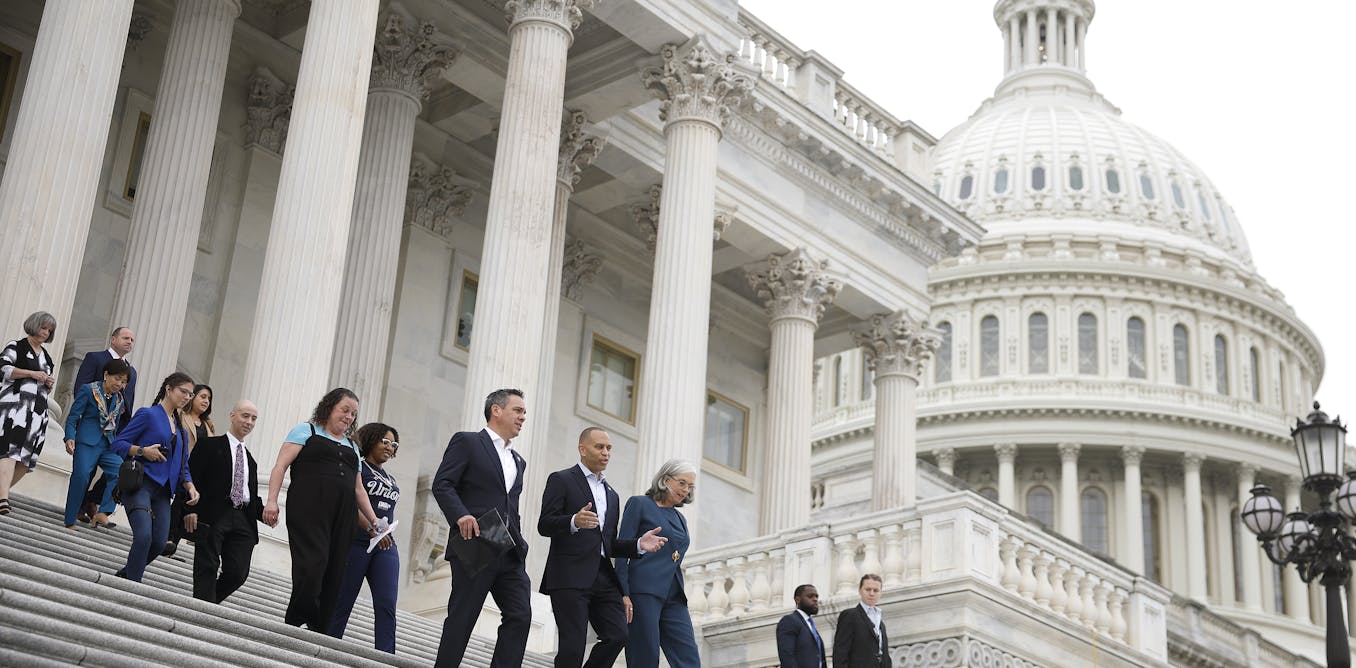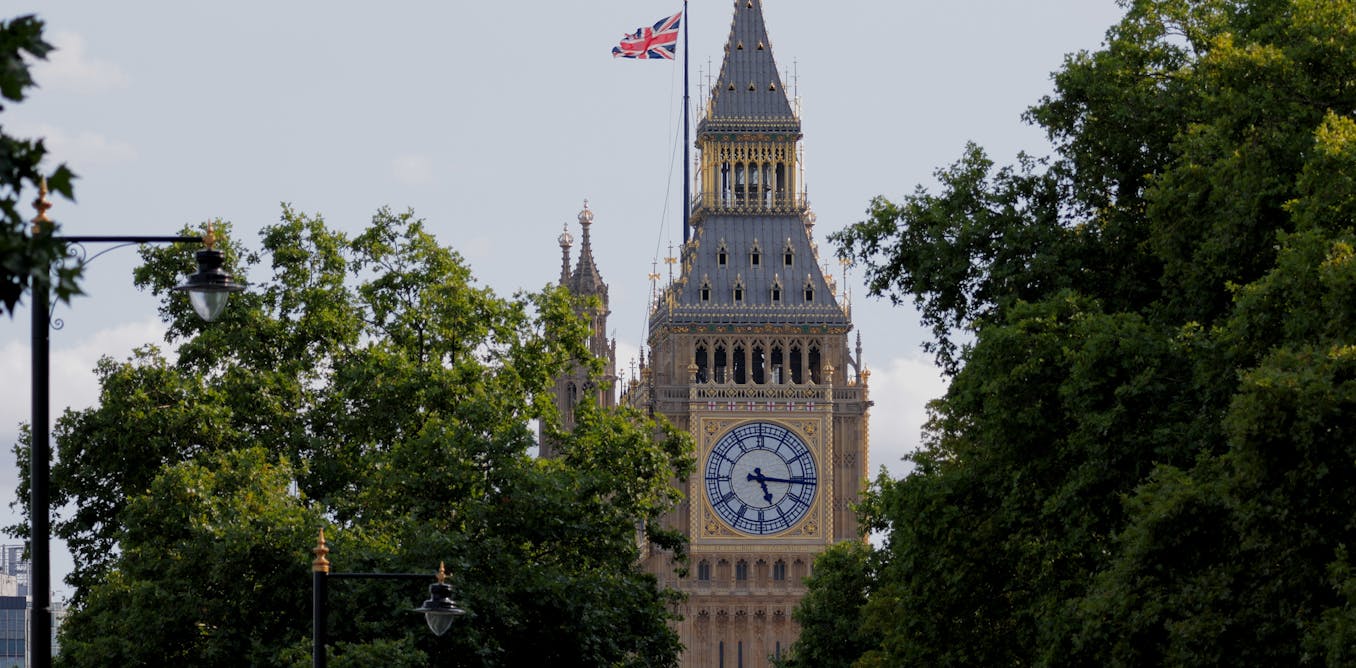The UK Space Agency (UKSA) has become part of the government’s Department for Science, Innovation and Technology (DSIT). The announcement was made on August 20 2025 by Chris Bryant MP, minister of state for data protection and telecoms.
Cutting red tape and duplicative bureaucracy within DSIT and UKSA seems to be the main rationale in the press release – that and bringing “together the people who shape space policy and those who deliver it”.
Though it sounds like a demotion for UKSA, what the changes mean in practice for the crafting of UK space policy, and the direction of UK space policy itself, remain uncertain. More importantly, rearranging the deckchairs of DSIT and UKSA will not resolve the chronic problems facing British space policy.
The first problem is that UKSA has lacked a clear identity and responsibility over policy, regulation and research within civil space activities. It is not like Nasa or the European Space Agency (Esa) – UKSA does not operate satellites, nor conduct major research and development projects by itself.
UKSA has competed with the Civil Aviation Authority (CAA) over licensing and regulatory powers for satellite launches from the UK, which the CAA has possessed since the mid-2010s.
On research, UKSA acted mostly as a research council, rivalling the work traditionally performed by the UK Research and Innovation’s and Science and Technology Funding Council (STFC).
STFC apportions funding for space science and research for universities and industry. UKSA is also the main point of contact for distributing Esa funding for British industry and university contributions to Europe-wide space projects.
UK space policymaking
UK space policy has always been an interdepartmental and Cabinet Office concern, and UKSA has traditionally only factored into consultations on the regulatory and civil space research dimensions of UK space policies. Since 2021, DSIT has taken on more space policy responsibilities regarding industrial strategy, further eroding a unique role for UKSA.
UKSA therefore has not carved out a clear niche that other departments or executive agencies cannot already claim competency within. The UK government’s position that duplication needs to be addressed is not an unreasonable one. The devil is in the details – which are missing at this time.
It is hard to say whether the bureaucratic changes will be better or worse for the creation and implementation of civil UK space policy and space science research.
The optics of this move can be easily seen and inaccurately spun as a negative in cancelling the UK space programme. No actual space projects are being cancelled.
AlanMorris / Shutterstock
The UK government has clearly recognised this, stressing that UKSA will retain a distinctive and recognisable branding in its new role, which has been effective at home and abroad in space science, industry promotion, and facilitating high-profile projects.
The second chronic problem that pre-dates UKSA – and will continue regardless of the musical chairs in Whitehall – is the lack of a coherent, joined-up national UK space programme with the funding to match. UKSA could never resolve these problems.
For example, the UK government has long pursued a policy of encouraging small satellite launch companies, yet has never allocated the funds necessary to deliver a tangible capability within any reasonable schedule, nor has it created a national UK satellite programme (civil or military) tailored to a high latitude launch profile, which could in turn create concrete demand for such a launcher.
After 15 years of drift, UK launch has gone from being ahead of the curve in Europe (with UK-based companies such as Skyrora and Orbex) to falling behind France, Sweden, or Spain as possibly the first new European small satellite launch providers.
This is a basic lesson in space programme design that seems lost on generations of British policymakers, but one that established satellite launching countries have taken to heart.
Modestly sized space powers have focused on crucial long-term national capability programmes and stumped up the cash for them, such as France’s Spot or India’s Insat programme. Such priorities are not evident in the UK across the civil and military space sectors.
As I explained to the UK House of Lords Select Committee’s UK Engagement with Space inquiry earlier this year, British space policy spreads out too little money in too many directions on small research projects rather than bold national infrastructural space programmes.
The government must also consider the security and military dimensions of space, which cannot exclude UKSA or the civil, industrial and research dimensions as they in turn provide the capability and know how to build British space systems.
The Boris Johnson government formed the National Space Council to drive and coordinate these partnerships, yet it was abolished by the Truss government and reinstated during the Sunak government. There have been no announcements from the Starmer government yet on any meetings of the council. This bureaucratic chaos has not helped efforts to cohere a strategic direction in space.
While the Ministry of Defence claims it wishes to invest in all manner of new space capabilities in the 2025 Strategic Defence Review, it cannot do so without a large injection of new funding, far beyond the billions already allocated for the military satellite Skynet 6 and defence satellite system ISTARI. More than funding, a clear decision on a specific capability is needed, rather than doing a little bit of everything.
Developing one kind of new satellite constellation, such as radar imagery for military operational needs – numbering in dozens of new satellites – would be the biggest undertaking for the MoD in space since the Skynet satellite communications system.
Doing the same for other capabilities at the same time, such as optical imagery, signals intelligence, or laser communications relays, would be as big a challenge again, and perhaps too much to take on at the same time.
For space policy wonks, academic researchers and the space industry, this rearrangement will not change much in the short term – for good and bad. UKSA was never fully independent to begin with, so the changes are likely to be more esoteric, subtle and bureaucratic.
That would require courageous policy decisions at the top of government to deliver a coherent, focused, joined-up and fully funded UK civil and defence space programmes.

The post “The UK Space Agency has been absorbed into the science department. The potential effects are still unclear” by Bleddyn Bowen, Associate Professor in Astropolitics and Space Warfare, School of Government and International Affairs (SGIA), Durham University was published on 08/21/2025 by theconversation.com



































Leave a Reply